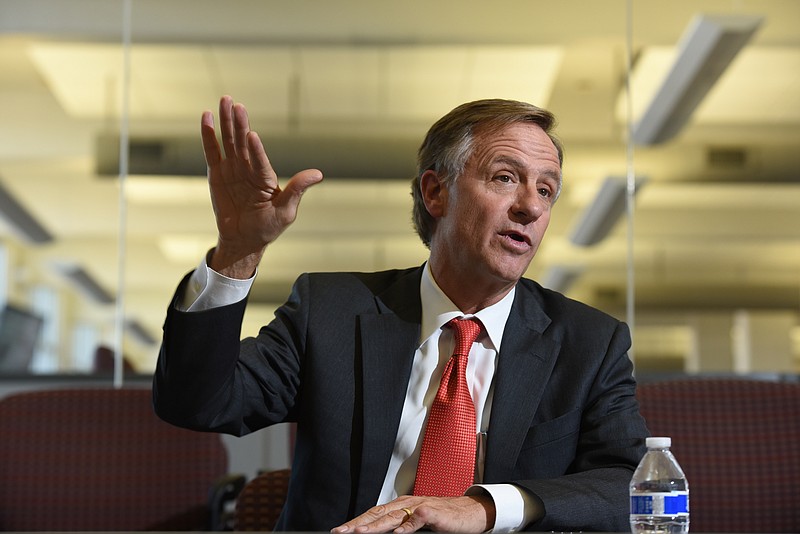NASHVILLE - A former Reagan administration economic adviser's "steak and caviar" argument against cutting Tennessee's sales tax on groceries to offset Republican Gov. Bill Haslam's proposed gas tax hike is proving to be one thing some lawmakers can't swallow.
Economist Arthur Laffer, whose famous "Laffer Curve" inspired Ronald Reagan's tax cuts aimed at fueling economic growth, described as "silly pandering" Haslam's proposal to cut the state's 5 percent sales tax on groceries by a half percentage point.
It won't help the poor, Laffer argued before a House committee this week. Cutting corporate taxes would, he said, because it would serve as a greater spur to Tennessee economic growth and job expansion.
Haslam has already included a reduction in business franchise and excise taxes, primarily for manufacturers, in his package of tax cuts.
During his presentation, Laffer said he saw little problem with Haslam's gas tax proposal itself so long as equal or more cuts are made in business taxes that fund non-highway areas of state government.
The governor's transportation plan calls for a 7-cents-per-gallon increase on gas and 12 cents on diesel. It raises much of the $278.5 million he's seeking through taxes and fees to help the state tackle an estimated $10.5 billion backlog of nearly 1,000 highway and bridge projects.
Haslam wants to cut $270 million in non-highway taxes in the state's general fund, which pays for most government functions.
Laffer's rejection of cutting the grocery tax, worth about $55 million annually to Tennessee taxpayers, drew skepticism from Rep. John Mark Windle, D-Livingston, who favors cutting the food levy even more and questions the governor's tax measures' real benefits for ordinary Tennesseans.
"But doesn't the tax cut on food cut the tax on baby formula for a working family?" Wendell asked Laffer on Tuesday in the House Transportation Subcommittee.
"Sure it might," replied Laffer, "but it also cut the tax on my buying a steak or caviar. It does. You want to do it where it has the most economic impact."
On Thursday Windle rejected Laffer's argument, saying, "I vehemently disagree with him that cutting taxes on baby formula, milk and eggs and bread for working families is a bad idea or it doesn't help the economy."
The Upper Cumberland Plateau lawmaker, who represents a largely rural area, added: "I don't represent the fat cats out in Belle Meade. And I'm not really concerned about their steak and caviar. I'm worried about working families making ends meet."
If approved, Haslam's proposed fuel tax increases would be the first in nearly 28 years.
With Tennessee experiencing huge surplus in non-highway taxes, Haslam's plan offsets the transportation-related increases, which include a $5-$20 increase on vehicle registration, with corresponding cuts in the grocery sales tax, the corporate tax for manufacturers and accelerating already approved plans to phase out the state's Hall tax on interest and dividends.
The sales tax cut on groceries amounts to about $55 million annually, while the corporate taxes come to about $116 million. The remainder goes toward accelerating the Hall tax, approved last year.
Critics charge eliminating the Hall tax largely benefits the wealthy and not ordinary Tennesseans. But Laffer, whose theories provided the foundation for Reaganomics in the 1980s, argues moves like these - Republicans already eliminated the state's inheritance and gift taxes - are proving a magnet to entrepreneurs and new investments in Tennessee.
Haslam told reporters Thursday that while he agrees with Laffer that the corporate tax cut is good for attracting businesses and encouraging existing companies to expand here, he is also trying to be even-handed when it comes to tax reductions.
"If we are going to have a tax cut, I'd like some of that to go to the one tax that everybody pays, and that's the grocery tax," Haslam said. "Will that bring more business to Tennessee? No. But is it fair? Yeah, I think it is fair."
Meanwhile, administration officials appeared delighted that Laffer isn't criticizing the actual fuel tax recommendations as the governor tries to persuade reluctant House Republicans to go along. Haslam argues it's worth it to ease traffic congestion, promote safety and boost economic development just as the last round of fuel tax increases in 1986 and 1989 did.
Tennessee is one of a number of states eyeing fuel tax increases.
Meanwhile, House Budget Subcommittee Chairman Gerald McCormick, R-Chattanooga, continued to advocate Thursday for deeper cuts in the sales tax on groceries.
"They deserve a tax cut if they're going to get hit with a tax increase," McCormick, the former majority leader, said. "I am opposed to just giving a tax cut to rich people and increasing taxes on poor people to pay for it."
House Minority Leader Craig Fitzhugh, D-Ripley, who wants to phase out the sales tax on groceries over a 10-year period, said the food levy is the one thing that hits all Tennesseans. He isn't buying Laffer's argument.
"Everybody buys milk, but not everyone buys caviar," he said.
Contact staff writer Andy Sher at asher@timesfreepress.com or 615-255-0550. Follow him on Twitter @AndySher1.
